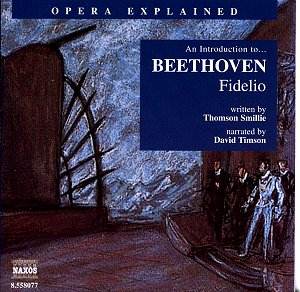Among the vast and unique resources available
to serve you from Musicweb is a staff reviewer who isn’t at all
familiar with Fidelio, and doesn’t care for what little
he does know, so I am in a position to appreciate this ‘Fidelio
for Dummies’ presentation exactly as intended.
Beethoven’s interest in Egyptian religion no
doubt enhanced his interest in this scenario for he surely realised
that it is a transparent resetting of the story of Isis and Osiris,
and how the faithful wife liberates her husband from the bonds
of death. Many of the trappings of Plutarch’s version of the tale
are there: The evil schemer, the disguise, the deception, the
appeal to authority, the wild ecstasy of the final triumph.
Beethoven was the first of many composers to
parade his neuroses before his listener, and since paranoia is
and was very common, especially in a Europe reeling from the multiple
shocks of the French Revolution and the Napoleonic wars which
followed, artistic depictions of paranoia by Beethoven and others
became and remained very popular. The Classical world would have
considered such things shockingly, embarrassingly, rudely, personal
and the Baroque world would have considered them irreverent, irrelevant,
and ugly. But borrowings from Mozart are heard in Fidelio,
as borrowings from Fidelio were to abound in the music
of the following century.
As a sales pitch for the Naxos complete recording
this disk is not completely successful. Yes, the sound is excellent
and the orchestra sounds terrific, but the lead soprano sounds
at once heavy, shrill, and wobbly, while in addition we hear that
most annoying of all voices, the baritone whose tone is all in
his nose. But perhaps I am being unfair, because naturally we
hear only selected emotional climaxes, and the singers may with
good justification be allowing their tone to run somewhat coarse
to express passion and conflict. But try to hear more before you
buy. Also, is it really justifiable to spend time in class defending
the cuts made in the recording? We should be talking about the
opera, not the particular version used to display it. But the
text is good and informative, and the delivery by David Timson
could not be any better. We tend to hear as examples reasonably
complete musical phrases without those annoying slow fades.
So did I hear anything to change my mind about
Fidelio, to make me want to hear the whole thing from beginning
to end? No. It is still a stuffy story abounding in silliness
and the music is nowhere as good as Beethoven’s best. I think
Beethoven was wise not to try another opera. I think the ‘Leonora
Overture No. 4’ spoof in the
Hoffnung concert says it all explicitly.
Paul Shoemaker
See also review
by Colin Clarke
